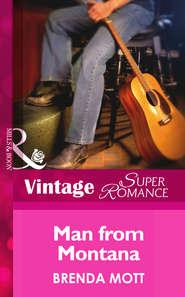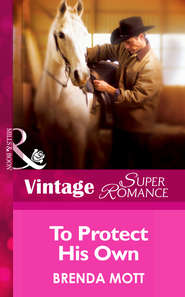По всем вопросам обращайтесь на: info@litportal.ru
(©) 2003-2025.
✖
Sarah's Legacy
Автор
Год написания книги
2019
Настройки чтения
Размер шрифта
Высота строк
Поля
Daddy’s little cowgirl. Gone from this earth, but not from our hearts.
From the dates on the headstone, Sarah had been just seven years old when her life ended a year ago…on this very day. Knowing that today was the anniversary of the little girl’s death made Bailey all the more sad. That a child’s life should be cut short seemed so unfair. Whose little girl was she? How had she died?
Bailey’s eyes burned with unshed tears. How many times had she wished for a child of her own? With no family, she often felt lonely. She traced the engraving with her fingertips, and her gaze strayed once more to the little blue spruce.
A porcelain angel, cheeks rosy, hands folded in prayer, topped the tree. The satin bulbs hung in the company of plastic reindeer, elves and teddy bears in Santa hats. The wind that must have blown through the night had scattered tinsel all about. Slivers of gold lay caught in the neatly clipped grass, and two of the ornaments had fallen to the ground at the base of the tree. Bailey picked them up.
The satin felt smooth against her palm, the ornaments weighing almost nothing. Carefully, she lifted one by its metal hook and placed it on the tree. As she hung the second bulb, she sensed someone behind her. Even so, the gruff voice startled her.
“What are you doing?”
Stifling a gasp, Bailey swung around and rose to her feet. Gray eyes as cool as the marble stones in Roth Hill glared back at her. At five foot nine, she had never been accused of being short, yet the stranger before her made her feel small. He topped six feet by a good three inches and had the muscles of someone well acquainted with physical labor. A black T-shirt stretched across his chest and was tucked into faded jeans, and he wore scuffed cowboy boots.
Bailey felt like an intruder. “I’m sorry.” She studied him. His face wasn’t movie-star handsome, but it was a face that would make a woman look twice. His dark blond hair, just long enough to brush the neckline of his T-shirt, made him seem like the type of guy a mother would warn her daughter to steer clear of. He clutched a paper sack in one hand; the other he held fisted at his side, not threateningly, but defensively.
“I saw the tree from the road,” Bailey went on, “and I was curious about it, so I stopped. I didn’t mean to intrude.”
His expression remained sullen. “It’s not meant as a curiosity.”
Her face warmed beneath his accusing glare. “Of course not.” She felt the need to say something further, but what? “I really am sorry.” She gave him a look of sympathy, sure he would soften. His expression changed not one little bit.
“Excuse me.” Bailey walked away, still feeling his gaze on her. Human nature had compelled her to stop, and she shouldn’t feel awkward that she had. But she did.
Reaching her car, she opened the door and slid inside. The hot upholstery burned her skin through her T-shirt. She cranked the engine and flicked on the air-conditioning. As she pressed the button to roll up her window, she couldn’t resist another glance at the stranger. He knelt in front of the grave and withdrew something from the paper sack.
Bailey watched him take an ornament and hang it on the tree.
Her heart ached for him and for the little girl who’d died at the age of seven.
She slammed her car door shut and drove from the cemetery.
BAILEY FOLLOWED the curves in the road, doing her best to shake the memory of the cowboy from her mind. He must be Sarah’s father. The way he’d stared her down left no other explanation. He didn’t want a stranger at his little girl’s grave, and she didn’t blame him. She reminded herself that small-town life was different from life in the city. A curious passerby in a cemetery in Denver might get overlooked. One here in the Colorado mountain town of Ferguson obviously wouldn’t. But then, that was the sort of thing that had first attracted her to this town. Its old-fashioned charm and laid-back ways were exactly what she wanted.
The road twisted in an S-shape, and as she rounded the curve and headed out on the straightaway, her house came into view.
Her house.
Not an apartment she’d rented for an obscene amount of money, where pets weren’t allowed and children were frowned upon.
The white-frame, two-story farmhouse sat on eighty acres. A white picket fence surrounded the front yard, with massive cottonwood trees offering shade. The backyard stretched in an expanse of long thick grass, bordered by shrubs of lilac and honeysuckle. The clothesline—a wire strung between two poles—was a place to hang sheets so the sun and wind would dry them and leave behind a touch of the outdoors. A swing on the porch provided the perfect spot for a mother to sit and watch her children play on a Saturday morning, a dog curled at her feet and Randy Travis singing on the kitchen radio.
Her own little corner of paradise.
She couldn’t wait to move in. Her furniture would arrive tomorrow, and though she’d had fun staying at the little bed-and-breakfast in town for the past two weeks while she cleaned up the farmhouse, settling into her own home would be nice.
For the first time in her thirty-three years, she had a home where she could put down roots.
It was something she’d never let anyone take away from her again.
TRENT MURDOCK HOPPED UP on the bed of his truck and cut the bright orange twine around the bale of alfalfa with his pocketknife. The herd of Arabian mares quickly gathered around the truck, bickering to establish pecking order. The closest ones thrust their heads eagerly over the top of the truck bed and tried to snatch a bite of hay.
“Get back!” Trent waved his arms at them, and they scattered to a respectable distance for all of thirty seconds before returning. He threw hay to them as the pickup rolled slowly along, driverless and in neutral gear, on the downward incline of the pasture.
He would have to move the mares to the upper field soon, but enough grass remained to hold them for another two or three weeks, anyway. They really didn’t need the hay he now tossed to them—though one would think so from their greedy antics—but he liked to baby them. He threw the last of it, then swung down from the pickup bed and slipped into the driver’s seat. Pressing his foot on the clutch, he put the truck in gear once more and drove toward the gate.
His mind wandered to the anniversary of his daughter’s death. It had been tough, and he’d fought the urge to get drunk the way he had a year ago. Instead, he had gone to the cemetery.
Everyone in Ferguson knew about Sarah and her battle with cancer. They’d paid their respects at her funeral but now stayed away. They’d given him plenty of space to grieve in the last year, plenty of time to be left alone. Though some of the ladies from the Baptist church occasionally put flowers on Sarah’s grave, no one else ever went there. Only him.
So he’d been surprised to find the woman there, crouched beside the tree, holding one of Sarah’s ornaments. He’d seen tears in her eyes when she’d spun around to face him. For the past year, he’d closed his heart to all emotion save his grief for his daughter. Nothing had touched him; nothing had penetrated the emptiness inside him. He didn’t like the fact that the woman in the cemetery had stirred something deep within him. Why should her tears bother him? He didn’t even know her.
He’d gruffly dismissed her, not wanting to learn so much as her name, but now her face preyed on his mind. Who was she? He didn’t remember ever having seen her around town. Not that it mattered. He had no interest in anyone or anything outside Windsong Ranch. The ranch was all he had left. It was all he needed.
Trent drove from the pasture, stopped and climbed out of the truck, then walked over to shut the gate. He dusted the chaff from his jeans, then climbed back into the pickup. He had errands to run, and no time to waste entertaining thoughts of a woman he didn’t even want to know.
The bank was the first stop on his list. A check for the sale of a yearling filly he’d shipped to Dallas was in his wallet and had been for a week now. Money meant little to him, just so long as he had enough to take care of the horses. Still, he should deposit the check in his account.
He saw her the minute he stepped through the doors of Colorado Western National Bank. He would scarcely have recognized her, if not for her eyes. Long-lashed, violet blue, they were the eyes behind the tears that haunted his memory. But the rest of her looked far different from what he recalled. Gone were her faded jeans and pink T-shirt, and her golden-brown hair was no longer confined to a braid. Instead, it fell in silky waves well past her shoulders. She wore a skirt and suit jacket, and sensible low-heeled pumps.
His gaze strayed down the length of her legs, long legs that went on forever, and back up to her face. She’d barely missed a beat in talking to the man who stood in the middle of the lobby with her, dressed in jeans, a tool belt slung low on his hips. Still, Trent knew he’d caught her attention. She glanced his way, then continued her conversation with the man, whose shirtsleeves were rolled up over tanned biceps and who kept flashing a toothpaste-commercial smile at her.
Trent couldn’t help wondering if the guy was business or pleasure. The woman’s persona hardly fit with Mr. Tool Belt’s, but then the image of her in the cemetery returned, and he realized there just might be two sides to her. It piqued his curiosity all the more.
Irritated that he was even taking time to think about her, or to care one way or the other whom she did or didn’t talk to, Trent strode past the two of them.
“Excuse me. Mr. Murdock?” Her voice curled around him like warm whiskey, and he tensed.
He wanted to ignore her. But he had a feeling she wouldn’t disappear that easily. Sighing, he faced her. She tucked the clipboard she held underneath one elbow and offered her hand. Reluctantly, he took it.
“I’m Bailey Chancellor.”
“It’s Trent, and I’m pleased to meet you.” His words were a formality only. He didn’t want to make small talk; he wanted to finish his business and leave. That she knew his name made him wonder if she’d asked someone. Or had she simply assumed he was Sarah’s father, having seen the last name on the headstone?
Her touch, her perfume, stirred something in him that he didn’t care to deal with. He released her hand and let his arm drop back to his side.
Bailey cleared her throat. “Look, I’m sorry about yesterday.” She hesitated, as though searching for the right words. “I want you to know I really mean that.”
He held her gaze, unable to turn away, and shrugged dismissively. “I guess I was a little uptight yesterday. It wasn’t a good day.” This was as close as he could bring himself to apologizing. She really hadn’t done anything, and he shouldn’t have snapped at her. But Sarah’s Christmas tree was a private thing.
Bailey lowered her voice. “We got off on the wrong foot. Neighbors in a small town shouldn’t do that.”
As her words sank in, he put the obvious together. His former neighbors, the ones who’d owned the eighty acres behind Windsong, had sold their place to the new president of Colorado Western National Bank, but he hadn’t realized that anyone was living there yet. So she was the woman who’d been the center of Ferguson gossip the past few weeks. Terrific.
“I suppose not,” he said grudgingly in response to her comment.
“Good. I’m glad you feel that way.” She smiled again. “Maybe you wouldn’t mind showing me your horses sometime. My secretary, Jenny, told me you own Windsong.”
Trent bristled. The last thing he needed was Bailey Chancellor coming to his ranch. He had no inclination to entertain a city woman with big ideas. Especially one who had his libido awakening for the first time in over a year. “I’m sorry.” He took a step backward. “I really can’t entertain visitors right now. I’m too busy preparing this year’s crop of weanlings for sale.”











